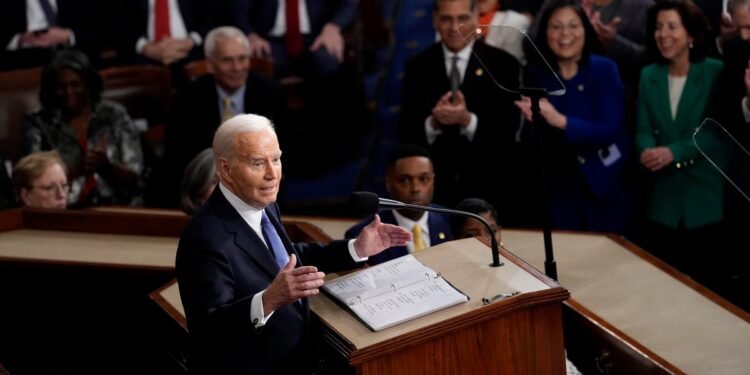
Photo: J. Scott Applewhite/AP
When assessing State of the Union speeches, what isn’t said can be just as interesting as what is.
During his speech last night, President Joe Biden did not mention how the war in Ukraine is ever going to end. He didn’t mention U.S. service member deaths since Hamas’s October 7 attack (including three U.S. troops killed by an attack drone in Jordan and two Navy SEALs who died during a mission to interdict a ship carrying weapons to Yemen). He didn’t talk about the 170 attacks on U.S. troops in Syria and Iraq since Israel’s war in Gaza began, the thousands of U.S. troops stationed in those same countries, plus Jordan, Saudi Arabia, Kuwait, Qatar, the United Arab Emirates, Oman, Djibouti, and even in small numbers, in Lebanon and Egypt. He didn’t address the forces in central Asia and Pakistan still overseeing an over-the-horizon war in Afghanistan. He didn’t talk about U.S. military aid to Israel, or Benjamin Netanyahu, or how the United States plans to use its influence to bring about an end to the conflict.
Biden didn’t mention the creeping surveillance state, or his recent affirmation of the NSA’s spying powers by pushing for the reauthorization of section 702 of the Foreign Intelligence Surveillance Act. He didn’t speak of upcoming increases in the military, intelligence, and homeland security budgets or justify why more than $2 trillion is now needed. He didn’t talk about the administration’s laser focus on domestic terrorism and extremism or how to pursue threats of violence and illegality while preserving the public’s right to privacy and free speech. He didn’t speak to the alleged national security threat posed by TikTok or the White House’s support for legislation that will try to ban the powerhouse social media app. He didn’t mention the growing dangers of war in space (or the space race now underway). He didn’t talk about alarming developments like autonomous weapons, robots, and drone armies, all of which through AI already threaten to change the very nature of warfare. And of course, not a word was said about nuclear arms control or any programs seeking disarmament.
At a time when the U.S. is closer to war with Iran than it has been in decades, Biden made just one reference to the country: “Creating stability in the Middle East also means containing the threat posed by Iran.”
Biden did not elaborate on what he means by containment: the large-scale U.S. airstrikes on Iran’s friends and proxies in Syria, Iraq, and Yemen. The administration has gone to great lengths to play down the rising tensions with Iran.
“We are not at war in the Middle East,” Pentagon press secretary Pat Ryder said in January as U.S. bombs were dropping in the region. “We currently assess that the fight between Israel and Hamas remains contained in Gaza.”
But the Iran-aligned groups warring with the U.S. have directly cited the war in Gaza as a motivating factor, including the Iraqi militant group that killed three U.S. troops in Jordan this January, as The Intercept previously reported.
Biden did mention that he “ordered strikes to degrade Houthi capabilities and defend U.S. Forces in the region.” But he did not explain why, after all these years, U.S. forces remain in the region, or how long they will stay or what is the endgame — especially when the national security community claims that it is shifting its attention to Russia and China.
The presence of U.S. forces and bases throughout a region is an important fact because the Biden administration justifies its airstrikes, including those on Houthi targets in Yemen, as self-defense, circumventing the need for congressional war powers authorization. The move has rankled members of Congress and led to internal debate among Biden’s own national security lawyers. But there’s no sign Biden has ever pondered that the U.S. presence is itself an irritant that contributes to escalation.
When the Biden administration was asked during a Senate hearing on February 27 if there was any historical precedent for Operation Prosperity Guardian, the Pentagon’s name for the U.S.-led military coalition formed to respond to Houthi attacks on ships in the Red Sea, a top administration official was stumped.
“Senator, I’d have to defer to colleagues to find the historical precedent for that,” Daniel Shapiro, deputy assistant secretary of defense for the Middle East, told Sen. Todd Young, R-Ind.
Despite all the genuine threats that weren’t mentioned, the speech still had a healthy dose of fearmongering, with Biden saying our democracy is facing greater peril than any point since the Civil War.
“Not since President Lincoln and the Civil War have freedom and democracy been under assault here at home as they are today.”









